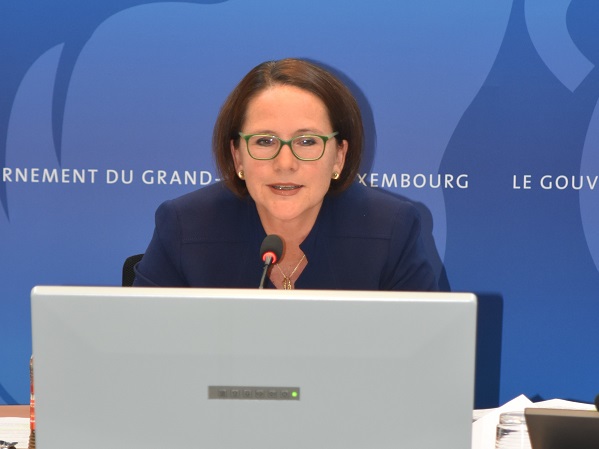 Yuriko Backes, Luxembourg's Minister of Finance;
Credit: MFIN
Yuriko Backes, Luxembourg's Minister of Finance;
Credit: MFIN
On Monday 26 September 2022, Luxembourg's Minister of Finance, Yuriko Backes, presented the financial situation of the State as of 31 August 2022 during a joint meeting between the Finance and Budget Committee and the Budget Execution Control Committee of the Chamber of Deputies (Luxembourg's parliament).
Minister Backes commented on this occasion: "While the current situation of public finances is turning out more favourably than expected, we must not lose sight of the fact that a marked deterioration is expected in the months to come and the challenges linked to the war in Ukraine and soaring energy prices are sure to leave their mark. The agreement reached by the tripartite will have a significant budgetary cost, but - coupled with the measures decided last spring - I am convinced that the consequences of inflation will be mitigated both for households and for businesses and without jeopardising the soundness of our public finances".
As of 31 August 2022, total government revenues amounted to €15.7 billion, an increase of 9.6% compared to the same period the previous year. Momentum slowed, however, given that revenues collected by the tax authorities corresponded to only 69.8% of the budgeted revenue; on 31 August 2021, such collected revenues already represented 74.2% of the budget.
More specifically, at the end of August 2022, revenues collected by the Luxembourg Inland Revenue (Administration des contributions directes - ACD) amounted to €7.2 billion, up 9.8% compared to the previous year. This increase is explained in particular by income tax, the receipts of which increased by €495 million or 15.5%, in the context of a growing labour market and a historically low unemployment rate.
Revenues collected by the Registration Duties, Estates and VAT Authority (Administration de l'enregistrement, des domaines et de la TVA - AED) also showed a positive trend, with a result of nearly €5 billion as of 31 August 2022, i.e. an increase of 8.5% in annual comparison. Revenues from VAT reflect the rise in inflation and are up by €292 million or 9.6% compared to the previous financial year.
At the end of August 2022, revenues collected by the Customs and Excise Agency (Administration des douanes et accises - ADA) increased by 5.8% compared to August 2021 and amounted to €1.3 billion. Diesel continued to show a decreasing trend in sales, with a 6% drop in annual comparison, seemingly in line with the government's commitment to reduce CO2 emissions.
Government expenses amounted to a total of €14.8 billion at the end of August 2022, representing an increase of €292 million or 2%. According to Luxembourg's Ministry of Finance, the relatively weak increase in expenditure in annual comparison is explained in particular by the fact that 2021 was still marked by exceptional expenditure linked to COVID-19. Public investments are also progressing at the same level as in 2021 and reach some €1.6 billion in the first eight months of the year.
The positive trend in revenue coupled with globally stable expenditure has led to a financial surplus, with the government balance (according to the European accounting rules SEC 2010) amounting to a surplus of €969 million as of 31 August 2022. However, a significant increase in expenditure and therefore a deterioration in this balance is expected over the coming months. This includes, in particular, the inflationary pressures on prices, the expected slowdown in the world economy and the implementation of the measures decided in the context of the "Solidaritéitspak" (solidarity package), the "Energiedësch" and the recent tripartite meeting.
Finance Minister Yuriko Backes concluded: "The evolution of public finances as of 31 August 2022 testifies to the resilience of the Luxembourg economy and shows that the State has the necessary leeway to finance the measures retained during the tripartite. As I prepare the draft budget for 2023, I pledge to work, on these solid foundations, in favour of the medium- and long-term sustainability of our public finances, while also addressing the structural challenges facing our country".








